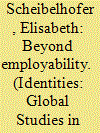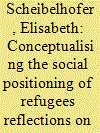| Srl | Item |
| 1 |
ID:
165696


|
|
|
|
|
| Summary/Abstract |
The so-called “refugee crisis“ put forced migration to the core of Europe in a way not seen for years. Since then, a plethora of unsolved global issues which have effects on more privileged nation-states in the global North has once again came to the fore. This is especially true for the EU member states who may hardly be conceived as unitary in confronting the challenges forced migration implies for nation-states. The so-called ”receiving countries” have often set aside the humanitarian aspect of granting asylum. From their point of view, there is an increased economic interest in refugees with higher formal qualifications and work experience, who could be integrated comparatively easily into the national work forces without further investments. At the same time, such refugees would also serve national economic interests by strengthening qualified labor. Compared to earlier years of reception, several parts of Europe have thus encountered another period of numerous arriving and at least temporarily resident refugees.
|
|
|
|
|
|
|
|
|
|
|
|
|
|
|
|
| 2 |
ID:
165698


|
|
|
|
|
| Summary/Abstract |
Presently, European and other countries are facing public (and scholarly) discussions surrounding the possibilities of successfully integrating refugees into their respective national labour markets. Such debates often disregard the complex circumstances under which refugees are received in a given nation-state. For this conceptually oriented article, we draw on the example of Austria as a receiving state, as it shares many characteristics with other receiving nation-states in the global north. Theoretically, we base our argument on the assumption that societies are socially unequal. Such inequality is institutionally co-constructed, as we will show in this article. Yet empirical examples assist in understanding how refugees are also actors who are not only exposed to such institutional and varying social environments. Rather, they also reinforce and/or change these circumstances by their own agency.
|
|
|
|
|
|
|
|
|
|
|
|
|
|
|
|